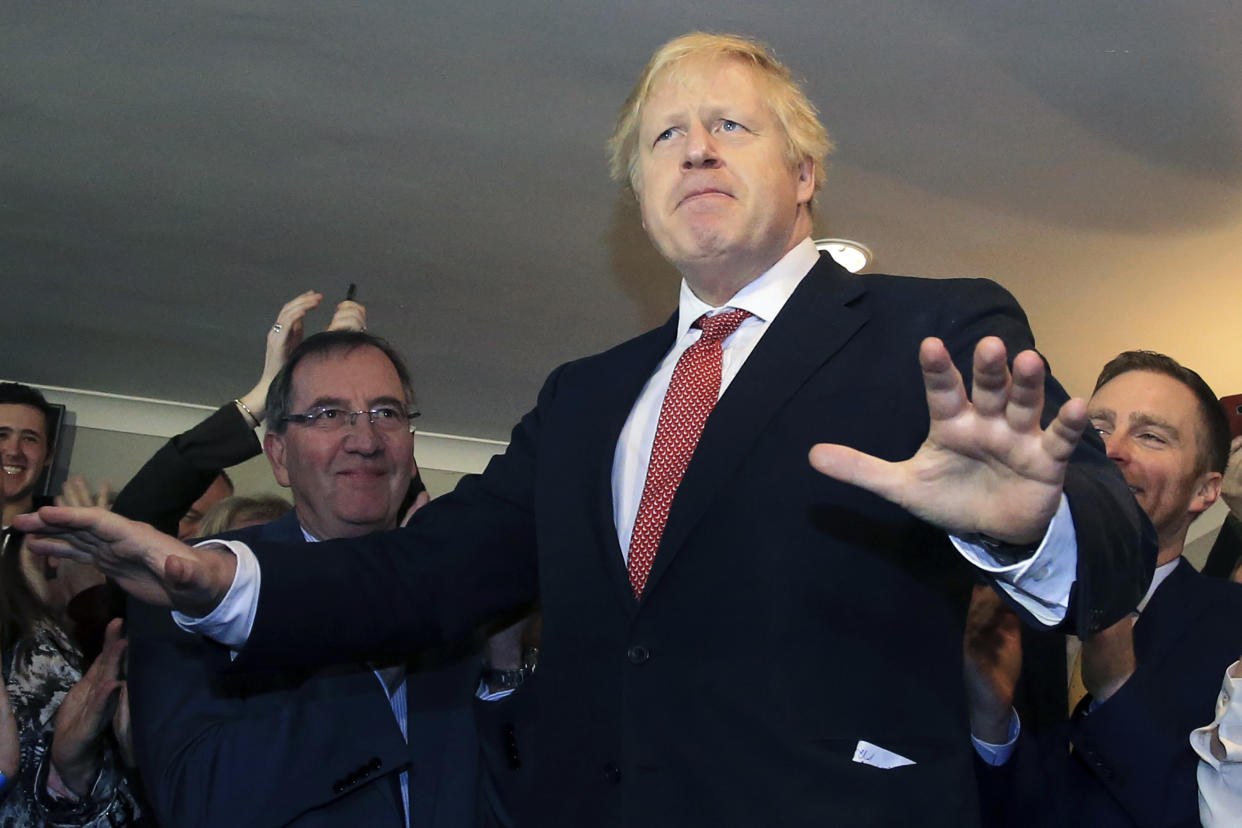What to Watch: Pound falls, UK employment, Unilever sales warning

Here are the top business, market, and economic stories you should be watching today in the UK, Europe, and abroad:
Pound falls on Boris Johnson Brexit
The pound fell by over 0.7% against the dollar (GBPUSD=X) on Tuesday morning after prime minister Boris Johnson signalled he would ensure that the UK would leave the EU by 2021.
While the pound remained above the $1.31 mark, and was trading close to $1.32, it has begun sliding since Johnson’s emphatic Conservative party victory in last week’s general election.
If the UK leaves the bloc on 31 January, a transition period is set to continue until December 2020.
The period can be extended for up to two years, if both the UK and EU members agree — something that would delay Brexit.
However, Johnson’s government is aiming to add a new clause to the Brexit bill to make it illegal for the UK to seek an extension.
The pound also fell by more than 0.9% against the euro (GBPEUR=X), to around €1.18.
UK employment hits record high
Employment unexpectedly increased and hit a new record high in the three months to October, despite Brexit uncertainty and a string of new warning signs over Britain’s economic health.
The latest official jobs figures from the Office for National Statistics (ONS) published on Tuesday show unemployment still near record lows at 3.8%, unchanged on the previous quarter. Some economists had expected it to tick up 0.1 percentage points.
The official employment rate rose to a record high of 76.2% between August and October 2019. Employers kept on hiring even in a period of heightened political uncertainty in the lead-up to Britain’s previous October Brexit deadline.
The number of people in work rose by 24,000 over the quarter.
Trainline's booking app helps UK passenger ticket sales soar 24%
Trainline’s (TRN.L) slick app helped UK consumer ticket sales soar by 24% at the rail booking firm in the nine months to 30 November.
The company, which went public and joined the FTSE 250 (^FTMC) earlier this year, said strong mobile demand and the increased use of e-tickets by rail firms and passengers had boosted its sales.
Trainline said in a trading statement on Tuesday its total net ticket sales had risen from £2.42bn in the nine months to 30 November last year to £2.86bn this year.
That included UK consumer sales of £1.54bn this year, with its UK Trainline for Business sales and international sales making up the rest.
But the company admitted to “some slowdown in the most recent quarter in discretionary travel spend” by large firms, leaving business sales edging only 2% higher.
Investors pull $5bn from Hong Kong as protests continue
Investors have pulled $5bn (£3.77bn) from Hong Kong since pro-democracy protests began in April, highlighting the economic toll on the Asian financial hub.
The Bank of England said in its Financial Stability Report, published on Monday, that cumulative outflows from investment funds in Hong Kong have reached around $5bn since unrest began. The outflows are equivalent to about 1.25% of the country’s GDP.
“The protests, and their impact on the real economy, highlight political risk as a key vulnerability in Hong Kong,” the Bank of England wrote in its report. “And these political tensions pose risks, given Hong Kong’s position as a major financial centre.”
Widespread protests erupted in Hong Kong in April after the autonomous region’s government tried to introduce a bill that would allow people to be extradited to mainland China.
Asia and West Africa hurt Unilever
Unilever (UNA.AS), the maker of Dove soaps and Marmite, on Tuesday warned that it would miss its full-year sales growth targets, blaming weakness in South Asia, West Africa, and North America.
The Anglo-Dutch consumer goods giant said that revenue growth for 2019 would come in “slightly below” its previously guided 3% to 5% range.
The company had already said that growth would come in at the lower end of that range, which is the level of growth the company is hoping to achieve over multiple years.
Unilever also said that growth in the first half of next year would be below 3%, and that full-year growth in 2020 would come in the lower half of the range.
Profits and margins will not be affected, the company said in an unscheduled trading update.
It pointed to “challenges” in the current quarter in some markets, including the economic slowdown in South Asia, which is one of its biggest markets. It said that trading conditions in West Africa remained “difficult”.
European stocks fall
European markets fell on Tuesday. The pan-European STOXX 600 index (^STOXX) was down by more than 0.6%.
The FTSE 100 (^FTSE) was down slightly in London. Germany’s DAX (^GDAXI) was down by more than 0.6%, while France’s CAC 40 (^FCHI) is down nearly 0.3%.
What to expect in the US
Futures are pointing to a mixed opening for US stocks.
S&P 500 futures (ES=F) are on the level. Dow Jones Industrial Average futures (YM=F) are down 0.1% and Nasdaq futures (NQ=F) are down very slightly.


